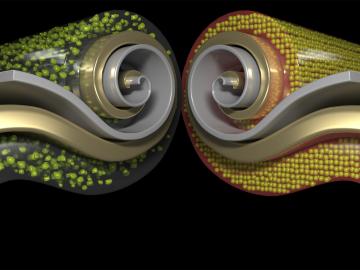
Filter News
Area of Research
- (-) Energy Science (143)
- (-) Materials (99)
- Advanced Manufacturing (22)
- Biological Systems (2)
- Biology and Environment (92)
- Biology and Soft Matter (1)
- Building Technologies (1)
- Computational Engineering (1)
- Electricity and Smart Grid (1)
- Energy Frontier Research Centers (1)
- Functional Materials for Energy (1)
- Fusion and Fission (12)
- Fusion Energy (7)
- Isotope Development and Production (1)
- Isotopes (5)
- Materials for Computing (11)
- Mathematics (1)
- National Security (11)
- Neutron Science (35)
- Nuclear Science and Technology (21)
- Nuclear Systems Modeling, Simulation and Validation (1)
- Quantum information Science (3)
- Supercomputing (47)
- Transportation Systems (1)
News Topics
- (-) 3-D Printing/Advanced Manufacturing (90)
- (-) Advanced Reactors (9)
- (-) Bioenergy (30)
- (-) Nanotechnology (41)
- (-) Physics (28)
- (-) Space Exploration (5)
- Artificial Intelligence (13)
- Big Data (7)
- Biology (12)
- Biomedical (10)
- Biotechnology (4)
- Buildings (38)
- Chemical Sciences (33)
- Clean Water (10)
- Composites (19)
- Computer Science (36)
- Coronavirus (14)
- Critical Materials (19)
- Cybersecurity (10)
- Energy Storage (85)
- Environment (64)
- Exascale Computing (3)
- Fossil Energy (2)
- Frontier (3)
- Fusion (7)
- Grid (40)
- High-Performance Computing (9)
- Hydropower (3)
- Irradiation (1)
- Isotopes (13)
- ITER (1)
- Machine Learning (10)
- Materials (94)
- Materials Science (90)
- Mathematics (3)
- Mercury (3)
- Microelectronics (1)
- Microscopy (29)
- Molten Salt (3)
- National Security (6)
- Neutron Science (42)
- Nuclear Energy (22)
- Partnerships (16)
- Polymers (21)
- Quantum Computing (3)
- Quantum Science (12)
- Security (7)
- Simulation (4)
- Statistics (1)
- Summit (6)
- Transportation (70)
Media Contacts

Seven scientists at the Department of Energy’s Oak Ridge National Laboratory have been named Battelle Distinguished Inventors, in recognition of their obtaining 14 or more patents during their careers at the lab.

David McCollum, a senior scientist at the ORNL and lead for the lab’s contributions to the Net Zero World Initiative, was one of more than 35,000 attendees in Egypt at the November 2022 Sharm El-Sheikh United Nations Framework Convention on Climate Change, or UNFCCC, Conference of the Parties, also known as COP27.

Scientists at the Department of Energy’s Oak Ridge National Laboratory are leading a new project to ensure that the fastest supercomputers can keep up with big data from high energy physics research.

The presence of minerals called ash in plants makes little difference to the fitness of new naturally derived compound materials designed for additive manufacturing, an Oak Ridge National Laboratory-led team found.

Oak Ridge National Laboratory researchers serendipitously discovered when they automated the beam of an electron microscope to precisely drill holes in the atomically thin lattice of graphene, the drilled holes closed up.

Researchers at ORNL have developed a new method for producing a key component of lithium-ion batteries. The result is a more affordable battery from a faster, less wasteful process that uses less toxic material.

Eight ORNL scientists are among the world’s most highly cited researchers, according to a bibliometric analysis conducted by the scientific publication analytics firm Clarivate.

Oak Ridge National Laboratory scientists designed a recyclable polymer for carbon-fiber composites to enable circular manufacturing of parts that boost energy efficiency in automotive, wind power and aerospace applications.

Nine student physicists and engineers from the #1-ranked Nuclear Engineering and Radiological Sciences Program at the University of Michigan, or UM, attended a scintillation detector workshop at Oak Ridge National Laboratory Oct. 10-13.

As the United States shifts away from fossil-fuel-burning cars and trucks, scientists at the Department of Energy’s Oak Ridge and Argonne national laboratories are exploring options for another form of transportation: trains. The research focuses on zero-carbon hydrogen and other low-carbon fuels as viable alternatives to diesel for the rail industry.


